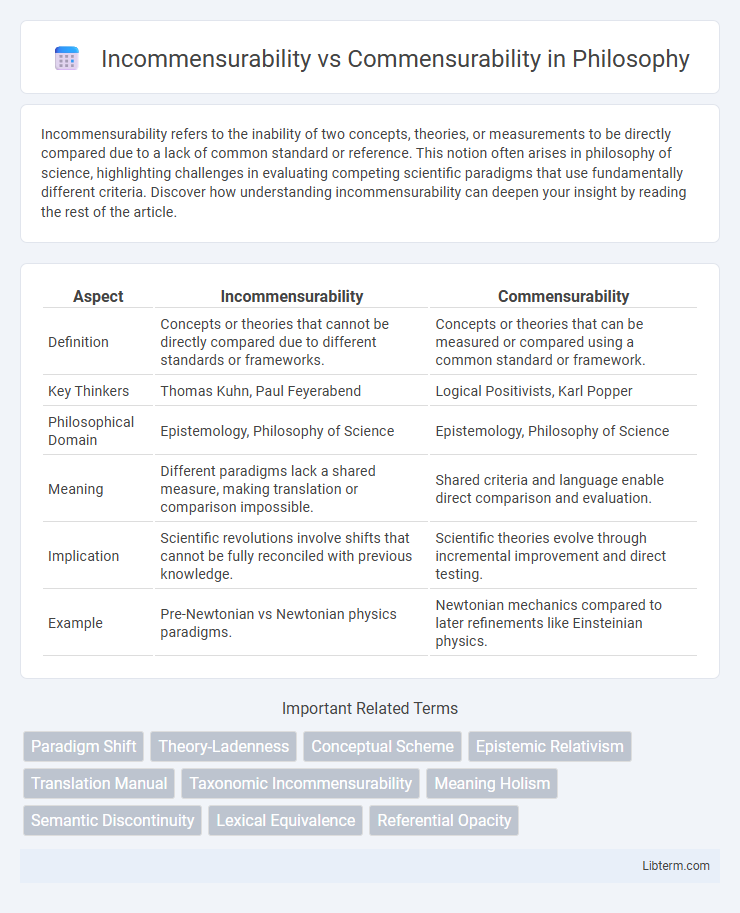Incommensurability refers to the inability of two concepts, theories, or measurements to be directly compared due to a lack of common standard or reference. This notion often arises in philosophy of science, highlighting challenges in evaluating competing scientific paradigms that use fundamentally different criteria. Discover how understanding incommensurability can deepen your insight by reading the rest of the article.
Table of Comparison
| Aspect | Incommensurability | Commensurability |
|---|---|---|
| Definition | Concepts or theories that cannot be directly compared due to different standards or frameworks. | Concepts or theories that can be measured or compared using a common standard or framework. |
| Key Thinkers | Thomas Kuhn, Paul Feyerabend | Logical Positivists, Karl Popper |
| Philosophical Domain | Epistemology, Philosophy of Science | Epistemology, Philosophy of Science |
| Meaning | Different paradigms lack a shared measure, making translation or comparison impossible. | Shared criteria and language enable direct comparison and evaluation. |
| Implication | Scientific revolutions involve shifts that cannot be fully reconciled with previous knowledge. | Scientific theories evolve through incremental improvement and direct testing. |
| Example | Pre-Newtonian vs Newtonian physics paradigms. | Newtonian mechanics compared to later refinements like Einsteinian physics. |
Understanding Incommensurability and Commensurability
Incommensurability refers to the inability to compare or measure two entities using a common standard, often resulting in distinct or incompatible frameworks, such as differing scientific paradigms or value systems. Commensurability allows for direct comparison and evaluation by applying a shared metric or language, facilitating consensus and coherence across diverse domains. Understanding these concepts is crucial in fields like epistemology, science, and ethics, where clarity about measurement and comparison underpins meaningful discourse.
Historical Context of the Debate
The debate over incommensurability versus commensurability emerged prominently in the philosophy of science during the mid-20th century, primarily through Thomas Kuhn's analysis of scientific revolutions. Kuhn argued that paradigms are incommensurable because they involve different standards, languages, and methodologies that prevent straightforward comparison, challenging earlier logical positivist ideas of cumulative scientific progress. This historical context reflects a shift from viewing scientific theories as universally comparable to understanding them as context-dependent frameworks shaped by historical and social factors.
Philosophical Foundations: Key Theorists
Incommensurability in philosophy, prominently explored by Thomas Kuhn and Paul Feyerabend, refers to the idea that scientific theories or paradigms are often so fundamentally different in terms of concepts and standards that they cannot be directly compared or measured against each other. Commensurability, grounded in the works of Karl Popper and Imre Lakatos, suggests that competing theories share a common metric or framework, allowing rational comparison and evaluation based on empirical evidence and logical consistency. The philosophical foundations of these concepts highlight ongoing debates about the nature of scientific progress, theory change, and the objectivity of knowledge.
Incommensurability in Scientific Paradigms
Incommensurability in scientific paradigms refers to the fundamental incompatibility between different theoretical frameworks, where concepts, methods, and standards cannot be directly compared or measured against each other. This notion, heavily emphasized by Thomas Kuhn, highlights the difficulty in translating terms or evaluating theories across competing paradigms due to differing ontologies and validation criteria. Incommensurability challenges the idea of linear scientific progress by suggesting that paradigm shifts involve radical changes in worldview rather than cumulative knowledge.
Criteria for Commensurability
Criteria for commensurability include the existence of a common measure or standard that allows for meaningful comparison between entities or concepts. This often involves shared dimensions, units, or languages enabling quantifiable evaluation and aggregation. Without such a common framework, ideas or values become incommensurable, lacking a basis for direct comparison or assessment.
Linguistic and Conceptual Barriers
Incommensurability in linguistics arises when language systems lack a common measure, leading to conceptual barriers that hinder translation and mutual understanding between distinct languages or paradigms. Commensurability allows for shared frameworks or metrics, facilitating communication and comparison across linguistic or conceptual divides. These barriers impact fields such as translation studies, philosophy of language, and intercultural communication by challenging the alignment of meanings and interpretations across diverse contexts.
Implications for Theory Comparison
Incommensurability implies that competing scientific theories lack a common measure for direct comparison, leading to challenges in evaluating their relative merits and progress. Commensurability enables theories to be assessed using shared frameworks, facilitating clearer criteria for theory choice and cumulative knowledge development. The implications for theory comparison hinge on whether paradigms can be reconciled on a common basis or require acceptance of fundamentally different standards of evaluation.
Case Studies: Science, Ethics, and Mathematics
Incommensurability in science often emerges when competing theories, such as Newtonian mechanics versus quantum physics, lack a common measure for direct comparison, complicating theory choice in case studies. Ethical dilemmas frequently illustrate incommensurability through conflicting moral frameworks, like utilitarianism versus deontology, where values cannot be precisely quantified or ranked. Conversely, commensurability appears in mathematics through standardized units and axiomatic systems that allow consistent measurement and comparison across proofs and problems.
Critiques and Counterarguments
Critiques of incommensurability highlight challenges in communication and comparison between competing scientific theories, arguing that it may exaggerate differences and undermine objective evaluation. Counterarguments emphasize that commensurability assumes shared standards that may not exist, enabling superficial comparisons that obscure paradigm shifts or fundamental conceptual changes. Both perspectives underscore the complexity of scientific progress, where neither absolute incommensurability nor complete commensurability fully accounts for theory change and interdisciplinary dialogue.
Future Directions in Incommensurability Research
Future directions in incommensurability research emphasize developing new frameworks to reconcile conflicting paradigms by integrating advanced computational models and interdisciplinary approaches. Researchers are exploring dynamic semantic mapping techniques and AI-driven analysis to quantify and bridge conceptual gaps between incompatible theoretical systems. Emerging studies prioritize practical applications in science, technology, and philosophy to enhance understanding and resolution of incommensurable differences.
Incommensurability Infographic

 libterm.com
libterm.com